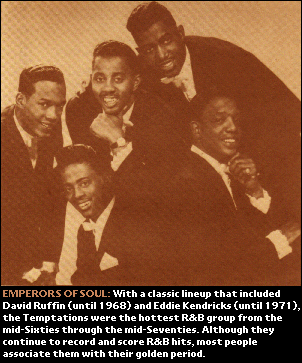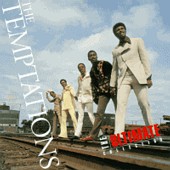|
The Temptations Gordy 7099 Jun. 1970 Billboard: #3
Considering the confused state of affairs and the pessimistic outlook that had descended on the country, disillusion was justifiable. Listening to this lyrical rant today, it's hard to believe that the country didn't collapse completely into a police state or a radical civil war. It's hard to say wheter the circumstances of conception have any effect on the resulting child, but if they do, then one can only wonder how many disaffected souls from the so-called Generation X were conceived while their parents listened to songs like "Ball of Confusion." Along with the consciousness-raising lyrics came a new and updated approach to instrumentation for Motown. Wah-wah pedals and distortion were sudddenly commonplace, as were electronically synthesized sounds and wildly exotic and self-indulgent arrangements. The post-hippie wasteland was grim indeed, but the music somehow didn't collapse -- yet. The most remarkable aspect of the Temptations' sudden embracing of social issues was how drastically different it was from their graceful past. It was as though they had been pulled forward through a time warp, yet their sound remained recognizable. Strange days required strange measures, and in the hands of Whitfield, the Temptations were plunged gracelessly into a time that spurned grace with "Ball of Confusion." The seventies also brought more changes to the group than lyrical ones. Paul Williams left for health reasons in 1971 (and allegedly committed suicide in 1973). Eddie Kendricks reasserted himself as lead singer, and his mellow "Just My Imagination" topped the charts in April of 1971. Kendricks himself then left the group to go solo, hitting number 2 with "Keep on Truckin'" in late 1973 and number one with "Boogie Down" in March 1974. The Temptations proved resilient, however. Despite all the personnel shakeups, they were back on top with the sensational million seller "Papa Was a Rollin' Stone" in late 1972. It won three Grammy awards that year -- Best R&B Performance, Best R&B Instrumental Performance, and Best R&B Song. The Temptations continued to record through the decade, switching from Motown to Atlantic Records, then back to Motown in 1980. But they never regained their former status. They were one of the top soul groups, if not the soul group from 1965 through 1972. Whether brilliantly interpreting Smokey Robinson tunes, spectacularly weaving sophisticated vocals with precision dance steps, or planting the musical seeds of disco with their wilder sounds in the late sixties, the Temptations demonstrated again and again a relentless capability for excellence -- a quality that was recognized in 1989 when they were inducted into the Rock and Roll Hall of Fame. - Thomas Ryan, American Hit Radio, Prima Entertainment, 1996.
SushiBearShout-Outs complicated :I but very well worded, also make this page exciting! don't you want more comments and likes? :) |


